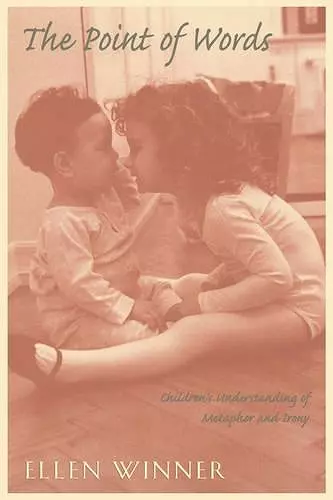The Point of Words
Children’s Understanding of Metaphor and Irony
Format:Paperback
Publisher:Harvard University Press
Published:24th Apr '97
Currently unavailable, and unfortunately no date known when it will be back

This is a deep and beautiful book about the developmental roots of irony and metaphor. -- Roger Brown Through a judicious blend of sound theory, anecdotal report and experimental evidence, Winner manages to turn soft cognition into hard science. -- David R. Olson Ellen Winner's insights into the development of metaphor and irony add immensely to our understanding of children and provide a richer appreciation of language's richest forms. -- Jerome Kagan
Psychologist Ellen Winner studies the creative, nonliteral discourse of children's spontaneous speech, examining how their abilities to use and interpret figurative language change as they grow older, and what such language shows us about the changing features of children's minds.
A small child looks at a dripping faucet and says that it is drooling." Another calls a centipede a "comb." An older child notices the mess in his younger brother's room and says, "Wow, it sure is neat in here." Children's spontaneous speech is rich in such creative, nonliteral discourse. How do children's abilities to use and interpret figurative language change as they grow older? What does such language show us about the changing features of children's minds?
In this absorbing book, psychologist Ellen Winner examines the development of the child's ability to use and understand metaphor and irony. These, she argues, are the two major forms of figurative language and are, moreover, complementary. Metaphor, which describes and sometimes explains, highlights attributes of a topic. As such, it serves primarily a cognitive function. Irony highlights the speaker's attitude toward the subject arid presupposes an appreciation of that attitude by the listener. In contrast to metaphor, irony serves primarily a social function. Winner looks in detail at the ways these forms of language differ structurally and at the cognitive and social capacities required for each.
The book not only draws on the author's own empirical studies but also offers a valuable synthesis of research in the area: it is the first account that spans the realm of figurative language. Winner writes clearly and engagingly and enlivens her account with many vivid examples from children's speech. The book will appeal to developmental psychologists, educators, psychologists of language, early-language specialists, students of literature, indeed, anyone who is delighted by the fanciful utterances of young children.
A rich book that addresses important issues. Winner is right that nonliteral language reflects a pervasive human ability, and revealing the bases and development of metaphor and irony displays fundamental aspects of human cognition. * Contemporary Psychology *
A wonderful overview of the important issues and empirical findings on children's understanding of metaphor and irony...The Point of Words should most certainly pique the interest of many child language researchers, and I recommend it to all students of figurative language. -- Raymond W. Gibbs, Jr. * Child Language *
A cogently argued book and one that also provides an accessible...introduction to what is likely to become an increasingly important topic in developmental psycholinguistics. -- Alan Garnham * Child Language Teaching and Therapy *
This is a comprehensive and closely argued examination of two features of children's language acquisition; metaphor and irony...Accessible to the lay reader, the well-referenced text, with an extensive bibliography, makes the book a useful introduction to the development of language in children. * National Literacy Trust, 1997 Bibliography [UK] *
This is a deep and beautiful book about the developmental roots of irony and metaphor. -- Roger Brown
Through a judicious blend of sound theory, anecdotal report and experimental evidence, Winner manages to turn soft cognition into hard science. -- David R. Olson
Ellen Winner's insights into the development of metaphor and irony add immensely to our understanding of children and provide a richer appreciation of language's richest forms. -- Jerome Kagan
ISBN: 9780674681262
Dimensions: 229mm x 152mm x 18mm
Weight: 354g
224 pages